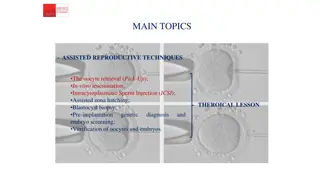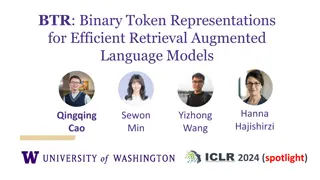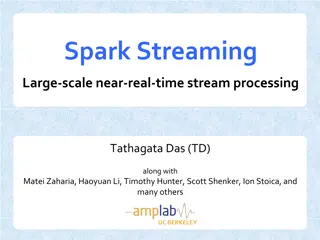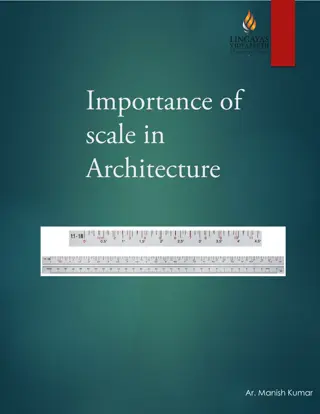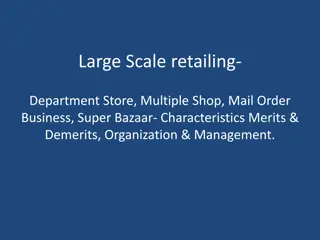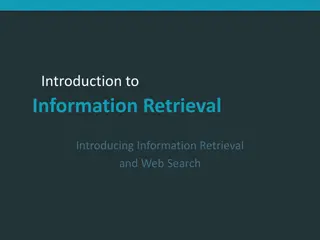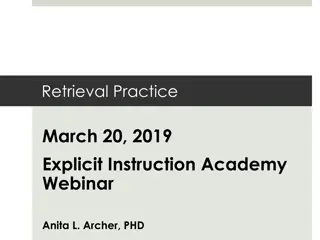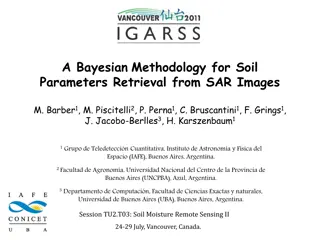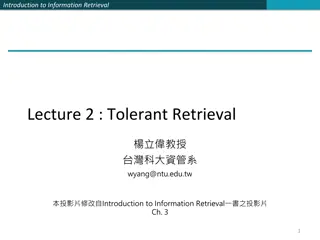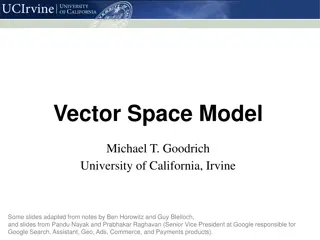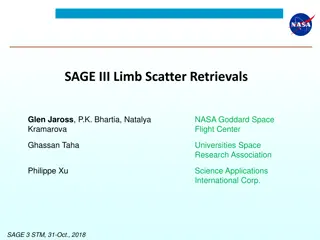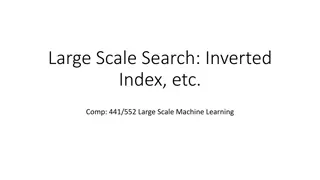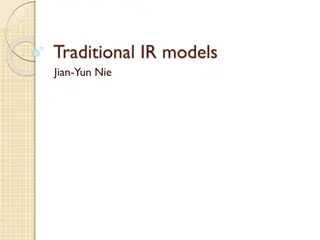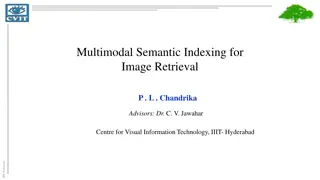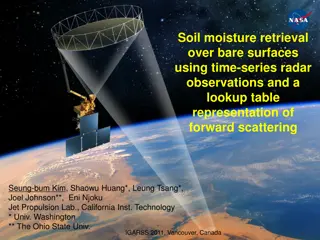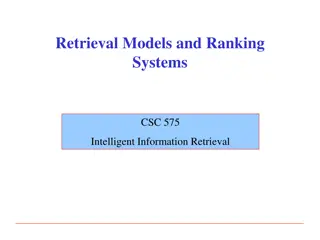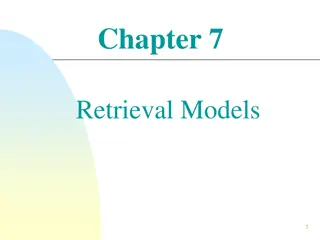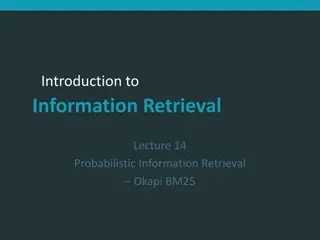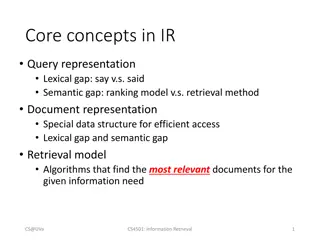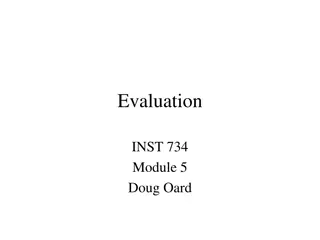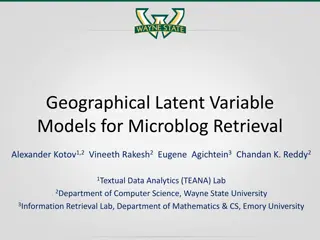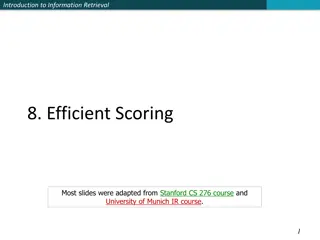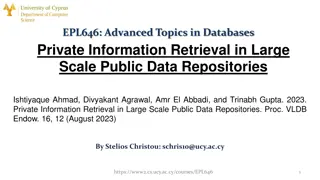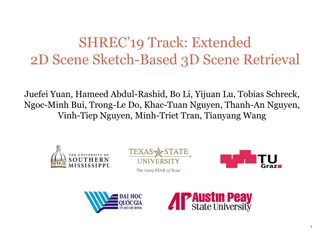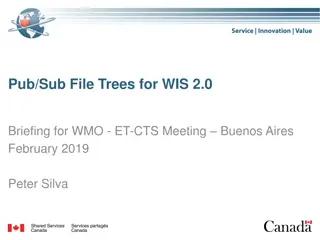Assisted Reproductive Techniques: Oocyte Retrieval Process
The process of oocyte retrieval in assisted reproductive techniques involves the careful retrieval of cumulus-oocyte complexes from follicular fluid under anesthesia and ultrasound guidance. These complexes are then sorted and stored before further procedures such as in-vitro insemination or intracy
1 views • 13 slides
Enhancing Geography Learning Through Metacognitive Retrieval Practice
Students in Geography can improve their learning by applying metacognitive retrieval practice techniques. Retrieval practice helps activate prior knowledge, enhances memory retention, and fosters critical thinking skills. Metacognition, which involves planning, monitoring, and evaluating one's learn
1 views • 19 slides
Understanding Scale Factors and Ratios in Similar Figures
Explore the concept of scale factors and ratios in similar figures through visible learning intentions, warm-up exercises, and practical examples. Learn to determine the scale factor between two similar figures, use scale factors to find missing sides, and apply the knowledge in real-world scenarios
3 views • 13 slides
BTR: Binary Token Representations for Efficient Retrieval Augmented Language Models
Retrieval-augmented language models like BTR address issues such as hallucination by providing efficient solutions for encoding input passages and queries. By utilizing cacheable binary token representations, BTR offers a unique approach to decomposing and binarizing passage encoding to improve runt
0 views • 9 slides
Introduction to Spark Streaming for Large-Scale Stream Processing
Spark Streaming, developed at UC Berkeley, extends the capabilities of Apache Spark for large-scale, near-real-time stream processing. With the ability to scale to hundreds of nodes and achieve low latencies, Spark Streaming offers efficient and fault-tolerant stateful stream processing through a si
0 views • 30 slides
Importance and Types of Scale in Architecture
Scale is crucial in architecture for accurate designs and execution. Standard scales are used in architectural drawings to set object sizes, such as human scale and miniature scale. Human scale relates to human dimensions, while miniature scale reduces object sizes. Understanding these scales enhanc
1 views • 6 slides
Understanding Large Scale Retailing and Store Classification
Large scale retailing encompasses department stores, multiple shops, mail-order businesses, and super bazaars. It can be classified into store-based and non-store based retailing, further divided based on ownership and merchandise offered. Store-based retailers include independent retailers, chain r
1 views • 16 slides
Understanding Retrieval Practice in Learning
Retrieval practice is a powerful learning strategy that involves recalling previously learned material to strengthen memory, improve long-term retention, and identify gaps in knowledge. It helps in combating forgetting, enhancing understanding, reducing test anxiety, and promoting independent study
0 views • 26 slides
The New Trade Theory and Economies of Scale in International Trade
The New Trade Theory, emerged in the 1970s, challenges traditional trade theories by emphasizing the role of increasing returns and economies of scale in international trade. It introduces the concept of industrial organization and imperfect competition to explain how countries trade not only based
0 views • 12 slides
Enhancing Information Retrieval with Augmented Generation Models
Augmented generation models, such as REALM and RAG, integrate retrieval and generation tasks to improve information retrieval processes. These models leverage background knowledge and language models to enhance recall and candidate generation. REALM focuses on concatenation and retrieval operations,
1 views • 9 slides
Understanding Acids and Bases: pH Scale Explained
Exploring the pH scale, this content delves into the fundamentals of acidity and alkalinity, covering what pH stands for, the inventor of the pH scale, reactions when acids and bases combine, and where the weakest acids and bases are found on the pH scale.
0 views • 7 slides
Introduction to Information Retrieval and Web Search
Information Retrieval (IR) involves finding unstructured material, typically text documents, within large collections stored on computers to satisfy information needs. This process extends beyond web search to include email search, corporate knowledge bases, and legal information retrieval. The text
0 views • 53 slides
Enhancing Geography Learning Through Metacognitive Strategies and Retrieval Practice
Utilizing metacognition and retrieval practice can significantly improve students' learning in Geography by facilitating the activation of prior knowledge, enhancing memory retention, and promoting self-regulated learning. Metacognition involves planning, monitoring, and evaluating one's learning pr
0 views • 19 slides
Understanding the Importance of Retrieval Practice in Learning
Retrieval practice is a powerful learning strategy where information is actively recalled from memory, strengthening retention and reducing forgetting. This method not only aids in strengthening recall but also enhances long-term memory, improves understanding, and facilitates knowledge transfer to
0 views • 39 slides
Taking Web Caching to the Next Level: Challenges and Solutions
Web caching plays a crucial role in improving user experience and reducing internet congestion. By implementing shared web caching on a larger scale, we can achieve significant benefits in terms of latency reduction. However, this approach comes with challenges such as efficient storage and retrieva
1 views • 20 slides
Bayesian Methodology for Soil Parameters Retrieval from SAR Images
Surface soil moisture retrieval is crucial for various applications such as climatic modeling, hydrological studies, and agronomy. This work focuses on developing a soil moisture retrieval algorithm using the SAOCOM L-Band polarimetric SAR system in Argentina. Limiting factors include spatial variab
1 views • 16 slides
Comprehensive Overview of Information Retrieval Techniques
This comprehensive overview delves into information retrieval concepts such as tolerant retrieval, inverted index, intersecting posting lists, and spelling correction. It also explores how Google utilizes the Boolean model for search queries and discusses various methods for spelling correction in d
2 views • 44 slides
Ranked Retrieval Models in Information Retrieval
Ranked retrieval in information retrieval systems offers an ordered list of top documents in response to free text queries, eliminating the issues of Boolean searches like "feast or famine". Users benefit from not being overwhelmed by vast result sets, as only the top results are presented. Scoring
0 views • 38 slides
Advanced Analysis of SAGE III Limb Scatter Retrievals
The proposed effort focuses on enhancing LaRC operational retrieval codes for SAGE LS data, correcting Level 1 radiances, and recommending LS operational scenarios. OMPS LS retrieval algorithms for aerosol and ozone, as well as the SAGE/M3 LS ozone retrieval approach, are detailed. Out-of-field stra
0 views • 12 slides
Efficient Solutions for Large-Scale Text Document Retrieval
In the realm of large-scale search and machine learning, implementing efficient solutions for text document retrieval is crucial. Techniques like inverted index and bitwise operations help overcome challenges of storage and sparsity in managing vast collections of documents. Measures like precision
0 views • 17 slides
WMO Scale of Assessment and Working Capital Fund
The WMO Scale of Assessment for members' contributions and the Working Capital Fund is based on the United Nations Scale, adjusted for differences in membership every 3 years. The latest scale approved by EC-75 for 2023 uses the UN scale from December 2021. The rates for 2026-2027 will be determined
0 views • 9 slides
Understanding Information Retrieval Models and Processes
Delve into the world of information retrieval models with a focus on traditional approaches, main processes like indexing and retrieval, cases of one-term and multi-term queries, and the evolution of IR models from boolean to probabilistic and vector space models. Explore the concept of IR models, r
0 views • 65 slides
Multimodal Semantic Indexing for Image Retrieval at IIIT Hyderabad
This research delves into multimodal semantic indexing methods for image retrieval, focusing on extending Latent Semantic Indexing (LSI) and probabilistic LSI to a multi-modal setting. Contributions include the refinement of graph models and partitioning algorithms to enhance image retrieval from tr
1 views • 28 slides
Soil Moisture Retrieval Over Bare Surfaces Using Radar Observations
This study focuses on retrieving soil moisture over bare surfaces using radar observations and a lookup table representation of forward scattering. The research aims to develop a non-empirical and simple method for accurate soil moisture retrieval without the need for ancillary information. Issues w
0 views • 14 slides
Intelligent Information Retrieval: Models, Ranking, and Algorithms
Explore the intricacies of retrieval models, ranking systems, and algorithms in the field of Intelligent Information Retrieval. Learn about the construction of indices, matching and scoring processes, distinguishing between exact-match and best-match retrieval, ranking algorithms like Boolean matchi
0 views • 36 slides
Understanding Retrieval Models in Information Retrieval
Retrieval models play a crucial role in defining the search process, with various assumptions and ranking algorithms. Relevance, a complex concept, is central to these models, though subject to disagreement. An overview of different retrieval models like Boolean, Vector Space, and Probabilistic Mode
0 views • 56 slides
Understanding Probabilistic Information Retrieval: Okapi BM25 Model
Probabilistic Information Retrieval plays a critical role in understanding user needs and matching them with relevant documents. This introduction explores the significance of using probabilities in Information Retrieval, focusing on topics such as classical probabilistic retrieval models, Okapi BM2
0 views • 27 slides
Understanding Core Concepts in Information Retrieval: Lexical and Semantic Gaps, Retrieval Models, and Algorithms
Explore the core concepts in Information Retrieval (IR) including lexical gaps like 'say' vs. 'said', semantic gaps, ranking models vs. retrieval methods, special data structures for efficient access, and algorithms for finding relevant documents. Understand the differences between IR and databases,
0 views • 46 slides
Evaluation Fundamentals and Interleaving Techniques in Information Retrieval
Explore the essentials of evaluation in Information Retrieval, covering topics like test collections, ranking, interleaving, and user studies. Understand batch and interleaved evaluation methods, user interaction feedback, and the motivation behind practical online retrieval evaluation. Dive into ba
0 views • 15 slides
Geographical Latent Variable Models for Microblog Retrieval
Addressing challenges in microblog retrieval such as vocabulary mismatch and multi-faceted relevance signals. Explore opportunities in leveraging lexical and non-lexical information, including geographical meta-data. Discuss prior work on utilizing timestamps and re-tweets, while also highlighting t
0 views • 19 slides
Application of Large-Scale Gas Electron Multiplier Technology to Digital Hadron Calorimetry by Andy White
Andy White from the University of Texas at Arlington presented on the application of Large-Scale Gas Electron Multiplier (GEM) technology to digital hadron calorimetry at the SiD Workshop in SLAC 2012. The study focuses on developing precision calorimetry for future accelerators using Double GEM lay
0 views • 36 slides
Comparing Scale-Up vs. Scale-Out in Cloud Storage and Graph Processing Systems
In this study, the authors analyze the dilemma of scale-up versus scale-out for cloud application users. They investigate whether scale-out is always superior to scale-up, particularly focusing on systems like Hadoop. The research provides insights on pricing models, deployment guidance, and perform
0 views • 27 slides
Introduction to Information Retrieval and Web Search
Information Retrieval (IR) involves finding unstructured material, usually text documents, to satisfy information needs from large collections. This process is essential for various applications like web search, email search, and corporate knowledge bases. The evolution of unstructured vs. structure
0 views • 15 slides
TEMPO Simulation and Retrieval Tools Testing at SAO
TEMPO Simulation and Retrieval Tools and Algorithm Testing at SAO involved performing retrieval sensitivity studies, adapting VLIDORT for TEMPO radiance spectra, utilizing TEMPO SNR model for optical transmission calculations, and using climatological a priori data for trace gases. The studies focus
0 views • 4 slides
Efficient Scoring Techniques in Information Retrieval
Today's focus in Information Retrieval is on efficiently scoring and ranking documents matching a query from an inverted index. The goal is to assign scores to each document and select the top K highest scoring ones. Cutting down CPU usage for scoring while maintaining result quality is essential. T
0 views • 18 slides
Private Information Retrieval in Large-Scale Data Repositories
Private Information Retrieval (PIR) is a protocol that allows clients to retrieve data privately without revealing the query or returned data to the server or anyone spying on the network. Encrypting data on the server is not a solution due to security concerns related to server ownership. This adva
0 views • 31 slides
SHREC19 Track: Extended 2D Scene Sketch-Based 3D Scene Retrieval Overview
The SHREC19 Track focuses on Extended 2D Scene Sketch-Based 3D Scene Retrieval, aiming to retrieve relevant 3D scene models using scene sketches as input. This challenging research direction addresses the semantic gap between 2D sketches and accurate 3D scene models, with vast applications in 3D sce
0 views • 29 slides
Effective Data Transport Strategies for Large-Scale Operations
Explore strategies for efficient data transport in large-scale operations, emphasizing moving towards more extensive data types, ensuring security, transparency, and manageability. Detailing transport options like (S)FTP(s) and HTTP(s) while prioritizing simplicity and flexibility. Considerations fo
0 views • 32 slides
Requirements for Semantic Biobanks and Global Biobank Data Retrieval
Explore the critical aspects of semantic interoperability in biobanking, highlighting the need for formal ontologies, comprehensive annotations, and model of meaning data. The (Generalized) Biomedical Retrieval Scenario underscores the importance of effective resource retrieval based on content-base
0 views • 16 slides
Flexible Spatio-temporal Indexing Scheme for Large Scale GPS Tracks Retrieval
This research paper discusses a novel spatio-temporal indexing scheme optimized for managing large-scale GPS data. The study introduces a stochastic process model to simulate user behavior in uploading GPS tracks, leading to a more efficient indexing scheme with smaller size, minimal update efforts,
0 views • 24 slides
